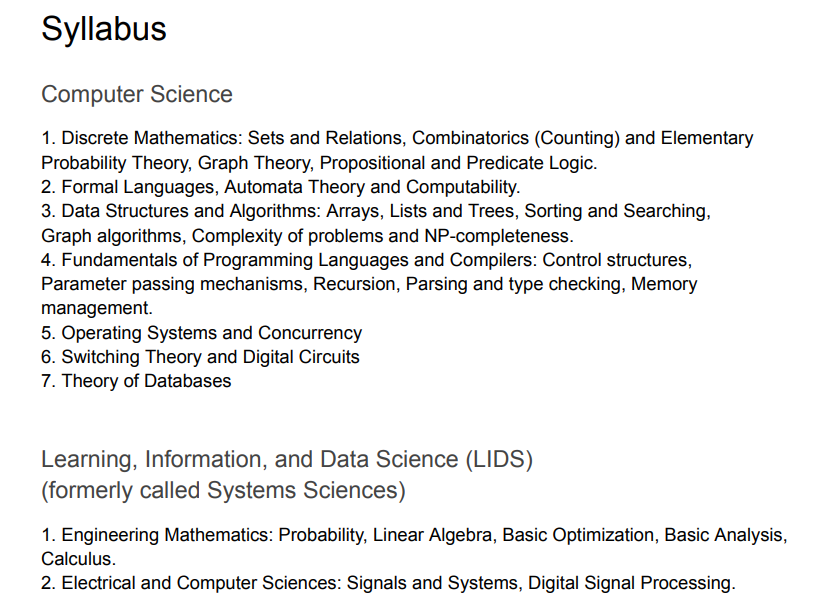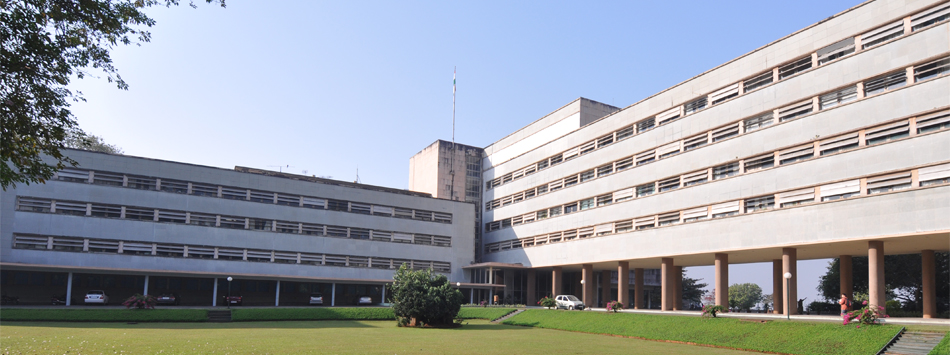
On March 21st, 2025, I attended an interview for the IPhD program at Tata Institute of Fundamental Research (TIFR), School of Theoretical Computer Science. I'm writing this post quite some time after the interview, so I forgot the specific questions they asked. Nevertheless, I will specify the topic they have asked and will mention a few things that I remember.
Background: The TIFR STCS graduate admission process consists of 2 rounds. The first is a computer-based exam (called the TIFR-GS exam), which usually happens in the month of December. Then the shortlisted students will be called for an on-campus interview, which typically happens in the month of March/April. The application happened in early October, and during the application process, we needed to select one from PhD/IPhD. Select this carefully after checking the eligibility criteria; also, the number of seats will be fixed for one program. My exam happened on December 8th. The question paper consists of three sections: the first one is an aptitude section, the second is for computer science, and the final one is for LIDS (Learning, Information, and Data Science). The first section was mandatory. You can choose one out of the remaining two sections with respect to your preference. If time permits, you can attend both. In that case, you will be considered for the best out of two streams. I attended the computer science section. A few weeks after the test, they released the key, and I was scoring approximately 75/120. On February 21st I got an e-mail from TIFR stating that I'm on the shortlist. They also sent me a form in which I was asked to submit a research problem that I'm interested in working on. There were options to give referrals as well (this was optional).

Interview experience :I reached Mumbai on the 20th night after an 18-hour train journey. This was the first mistake I have made. Due to the long journey
and new environment, my sleep got affected. For the next morning at 9, when I was reporting at TIFR, I was slightly tired.
TIFR Mumbai is situated at Colaba, on the western coast of Mumbai. The campus is situated at an important naval area, so you can see a lot of
security officers and militants around the campus. Even though I came with my parents, I was the only one allowed to go inside.
At 9 o'clock in the morning, I reported to the D block. There were 3 students from the computer science stream and 4 to 5 students from LIDS.
By 9.30, all three of us got called to the interview room.
The room was like a small seminar room—there was a big blackboard and a table where professors were sitting. After a brief introduction, Professor Umang Bhasker, who was the leading panellist, explained the interview procedure. He told us that there will be two rounds:they will start with some basic questions, followed by “offline questions.” These offline questions are research-orientated questions.This can be carried out of the room, and we can think about it during break. The second session will be based on our approach to offline questions. Obviously, no internet, no external discussion. Our waiting room will be monitored by camera. Even if you manage to get an answer to a question by some unethical methods, you have to explain your answer, and you are expected to prove everything around that concept.
After a brief wait, my turn came. When I entered the seminar room, I saw six professors in my panel. Prof. Umang, Prof. Prahladh Harsha, Prof. Ramprasad Saptarishi, Prof. Mrinal Kumar, Prof. Jatin Batra, and Prof. Raghuvansh Saxena. The panel asked me five or six questions; all of them were from different areas. The first question was related to conditional probability. Even though probability theory was one of my favourite subjects, I was extremely nervous and felt completely blank in front of the big blackboard. The biggest challenge I faced was thinking in that pressure situation. The professors were generous and really tried their best to calm me down. Though I answered some sub-questions, I couldn't reach the final answer. Every time I couldn't answer a question, my confidence stooped further low. After the probability question, I faced questions from these areas: trace of a matrix and eigenvalues, sorting algorithms, functional complexity, and a question related to some operation on an array. My responses to almost all the above questions were more or less the same: couldn’t reach the final answer. Often I couldn’t even comprehend the question. Professors told me not to worry, and they wrote all the questions I couldn’t answer on a paper and gave it to me. So my first interview session ended up being a disaster.
While having lunch from the TIFR mess, I thought aloud about the questions I got assigned. Fortunately I managed to find the answer to two questions (out of four). At 2 PM, our afternoon session started. This time, my interview went comparatively better. I explained my approach towards the given questions, and the professors dug deep with further questions. There were some moments where I felt stuck, but overall I concluded the session well. In the end, the panellists offered me some tea and cutlets, and I knew that it was a participation prize.
This experience was tough for me, but that day I learnt a lot of things. When I was walking out of TIFR campus, I knew exactly where I made mistakes. This experience was the cornerstone for my IISc interview success.
Verdict and learnings : On April 29, I got the mail from TIFR stating that I didn't get selected. But it was expected, and that was the time I was preparing for the IISc CSA interview. The first thing I did was buy a small blackboard. If you are someone who is preparing for research interviews, I strongly suggest doing this—this will help you feel regular while solving problems in front of the interview panel. In TIFR, despite being top researchers in the country, the professors were very helpful and down-to-earth. The questions they asked were doable as well. But make sure everything you say in front of the panel you should be able to defend with proper proofs/explanations. Finally, a golden lesson I learnt—the importance of being calm in pressure situations!
